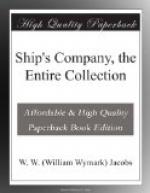“‘Cabin-boy?’ I ses. ‘No, I ain’t.’
“’I’ve run away from ‘ome to go to sea,’ he ses, and I’m afraid of being pursued. Can I come inside?’
“Afore I could say ‘No’ he ’ad come, bag and all; and afore I could say anything else he ’ad nipped into the office and stood there with his ’and on his chest panting.
“‘I know I can trust you,’ he ses; ’I can see it by your face.”
“’Wot ’ave you run away from ‘ome for?’ I ses. ’Have they been ill-treating of you?’
“‘Ill-treating me?’ he ses, with a laugh. ’Not much. Why, I expect my father is running about all over the place offering rewards for me. He wouldn’t lose me for a thousand pounds.’
“I pricked up my ears at that; I don’t deny it. Anybody would. Besides, I knew it would be doing him a kindness to hand ’im back to ’is father. And then I did a bit o’ thinking to see ’ow it was to be done.
“‘Sit down,’ I ses, putting three or four ledgers on the floor behind one of the desks. ‘Sit down, and let’s talk it over.’
“We talked away for ever so long, but, do all I would, I couldn’t persuade ’im. His ’ead was stuffed full of coral islands and smugglers and pirates and foreign ports. He said ’e wanted to see the world, and flying-fish.
“‘I love the blue billers,’ he ses; ’the heaving blue billers is wot I want.’
“I tried to explain to ’im who would be doing the heaving, but ’e wouldn’t listen to me. He sat on them ledgers like a little wooden image, looking up at me and shaking his ’ead, and when I told ’im of storms and shipwrecks he just smacked ’is lips and his blue eyes shone with joy. Arter a time I saw it was no good trying to persuade ’im, and I pretended to give way.
“‘I think I can get you a ship with a friend o’ mine,’ I ses; ’but, mind, I’ve got to relieve your pore father’s mind—I must let ’im know wot’s become of you.’
“‘Not before I’ve sailed,’ he ses, very quick.
“‘Certingly not,’ I ses. ’But you must give me ’is name and address, and, arter the Blue Shark—that’s the name of your ship—is clear of the land, I’ll send ’im a letter with no name to it, saying where you ave gorn.’
“He didn’t seem to like it at fust, and said ’e would write ’imself, but arter I ’ad pointed out that ’e might forget and that I was responsible, ’e gave way and told me that ’is father was named Mr. Watson, and he kept a big draper’s shop in the Commercial Road.
“We talked a bit arter that, just to stop ’is suspicions, and then I told ’im to stay where ’e was on the floor, out of sight of the window, while I went to see my friend the captain.
“I stood outside for a moment trying to make up my mind wot to do. O’course, I ’ad no business, strictly speaking, to leave the wharf, but, on the other ’and, there was a father’s ’art to relieve. I edged along bit by bit while I was thinking, and then, arter looking back once or twice to make sure that the boy wasn’t watching me, I set off for the Commercial Road as hard as I could go.




